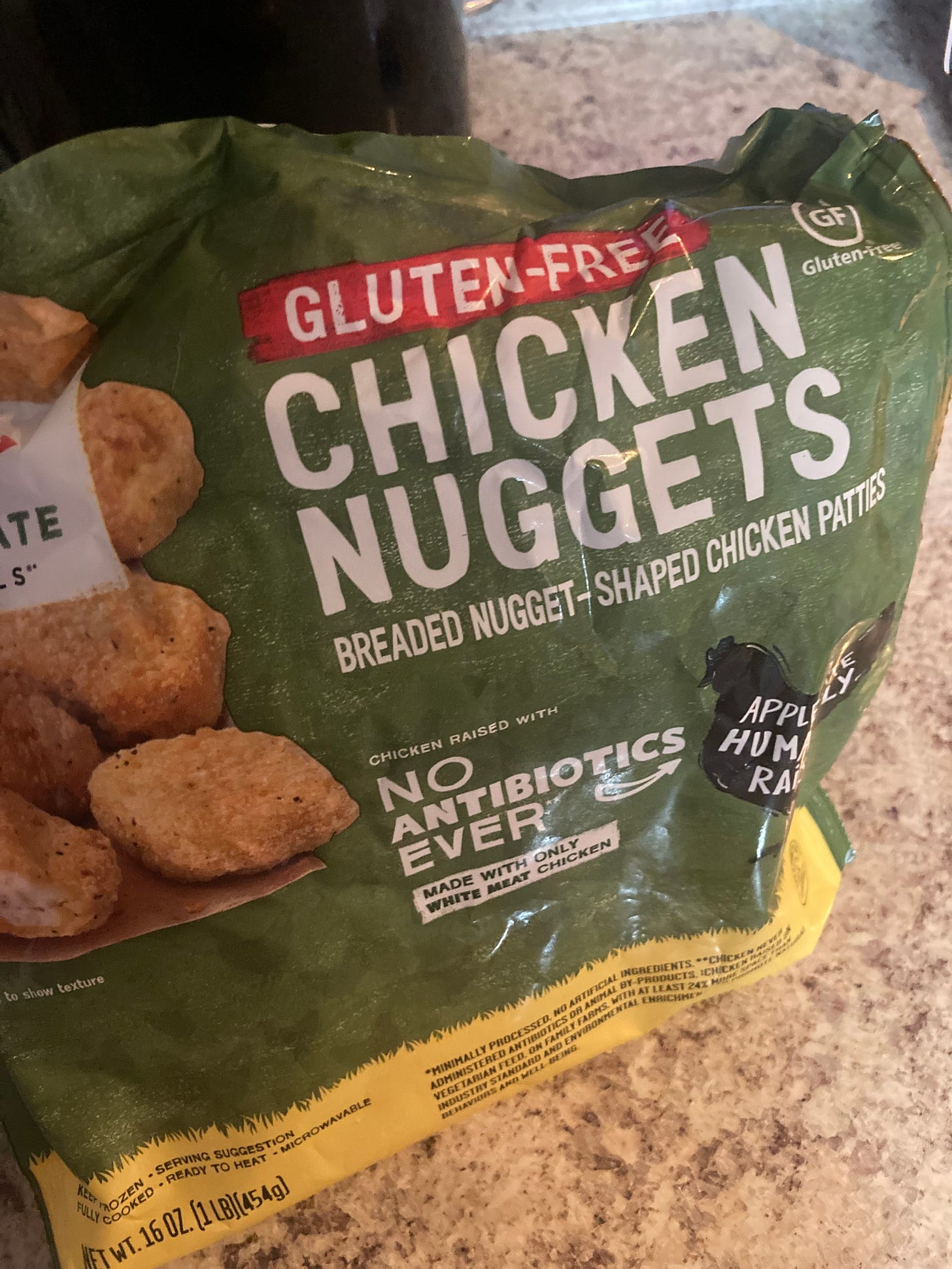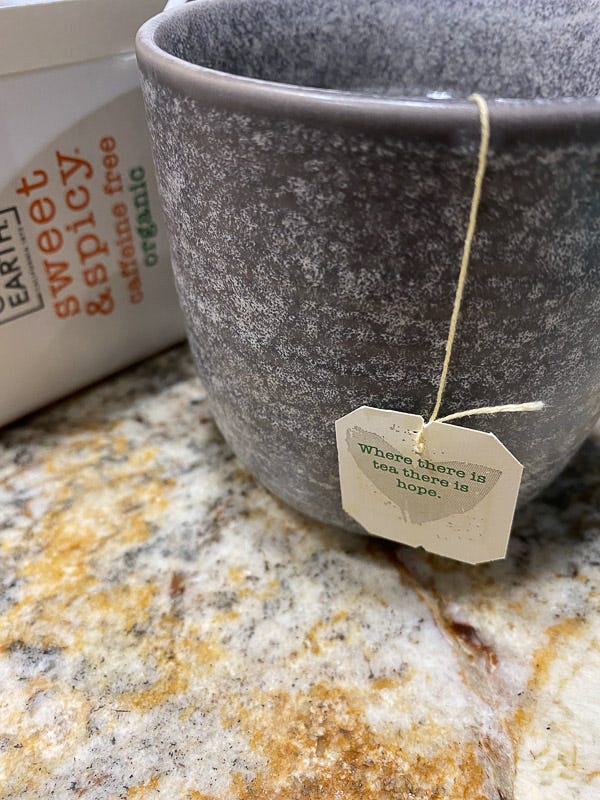Listen, if you’re out here drinking bubbly water (is anyone not?) you have bubble preferences. Every brand has a different style of bubble and if you don’t know what I’m talking about, yes you do. The best bubbles of all the bubbles are in those glass Topo Chico bottles. I don’t know how they get those bubbles so crisp and spicy out there in Monterrey, Mexico, but there’s nothing like it.
Hold on. What on earth does this have to do with grief? Well nothing, except that when you’re grieving everything else in your life keeps going on. That’s one of the mercies of grief and it’s also one of the hardest things. Because you’re grieving but you’ll also find yourself drinking Topo Chico and eating tacos and doing laundry and going to work and doing your commute and raising your kids and making dinner and taking showers and talking to your friends and grieving. And sometimes you’re glad to be doing something else other than grieving and other times you’re a little bit horrified that you’re having a conversation with someone about bubbly water even though the most important person in your life just died.
It’s one of the many many reasons that grief is weird. And also one of the reasons that we start each episode in the middle of life. Because that’s where grief finds us.
As we start the episode today, Tracy tells us a little bit about the eeriness that is raising a child in grief (more on this later). One of their family traditions is to track everyone’s height on the wall in the pantry. This ritual has also become a measuring stick for grief - how long has it been since the loss, and how do we measure?
The topic of the episode today was how grief can change your other relationships. There’s so much more here to say, so this is just scratching the surface but we have some thoughts that might be helpful.
Negative Changes —
Grief can lead to emotional withdrawal from others as a protective mechanism. This distancing might create misunderstandings or feelings of rejection among loved ones.
Grief can make individuals more sensitive to others' words and actions, sometimes leading to conflict. Even among grievers this can happen - conflict can come from differences in grieving styles or unmet expectations for support.
Grief can create a potential for resentment if one person feels neglected or misunderstood during their grieving process.
Positive Changes —
Grief can bring people closer, fostering a deeper connection and support because the vulnerability in grief can lead to more authentic and meaningful interactions.
The same heightened sensitivity that can lead to conflicts might also deepen empathy and understanding in certain relationships.
Grief can introduce new relationships or strengthen less prominent ones, as people seek comfort in unexpected places. support groups or communities around loss can make you feel more connected than you were before the loss.
What to do if you’re a griever —
Wait, are we giving grievers a to-do list on top of their grief? Yes. Stay with me! It might seem counterintuitive to think about what a griever has to do to maintain their relationships as they grieve. But since we’re all living in a society that just does not know how to do grief, that means we all have work to do. It’s really hard to lose connections in addition to the loss you’ve just suffered and here are some things you can think about that might help.
Clear and honest communication about needs and feelings during grief. You don’t always know what you need and that’s ok! But as soon as you do (even if it’s after the fact), bring it into the room. Your loved ones likely want to help and be there for you but may feel overwhelmed and at a loss about what they can actually do or say. Also. Unspoken expectations are the seeds of future resentments.
Consider therapy to navigate the complexities of it. Individual therapy is great support, and so is couples therapy. Even if you do not think you need it, consider this anyway. There are so many options out there and sometimes just a couple of sessions with a therapist on communication can right the ship.
Carve out space for grief in the relationship allowing for shared mourning without overwhelming the relationship. If you’re grieving a shared loss, you can each pick 2-3 things to put on the calendar to commemorate. This enables each person to carve out time to grieve in the way that feels natural to them.
What to do if you’re supporting a griever —
You might be thinking, "Shouldn’t I just be present and let the griever lead?" Yes, absolutely. But the reality is, supporting someone in grief can be confusing and challenging, especially when you're unsure of what they need. And just like the griever, you have work to do too. This isn’t about taking over or fixing anything, but rather about being a compassionate, steady presence. Here are a few ideas that can help you support your loved one effectively.
Offer consistent, gentle check-ins without pressure. Grievers often feel like they’re burdening others with their pain. By regularly reaching out with simple messages like, “How’s your grief?,” or “Status check!” you let them know they’re not alone without making them feel obligated to respond or share more than they’re ready for.
Be patient with fluctuating needs and emotions. Grief is not linear. One day they might need company, and the next, solitude. Respect their boundaries and be adaptable to their changing needs, even if it’s hard to understand. This flexibility shows deep care and respect for their process.
Help with practical tasks, but offer rather than assume. Grief can make even the simplest tasks feel overwhelming. Offering to help with things like grocery shopping, meal prep, or household chores can be a huge relief. However, always offer first instead of assuming what they need; sometimes the smallest gesture means the most, but it has to come from a place of sensitivity to their current state.
Supporting a griever isn’t about fixing their pain but being a reliable and compassionate presence in the storm.
As we wrapped up the episode, we talked about how to conjure us in a seance. Because of course. We each picked three things you’d need to access us from the beyond.
MC:
The first and most important thing is Schleeps, my bunny from childhood. (If you read Unbroken, Schleeps is the bunny that replaced bunny and I have not lost this one.)
Topo Chico, because, duh. Do I love it so much that I had a photo of it readily available on my phone? Yes, yes I do and did.
Also, chicken nuggets, because they are the perfect food. (Did I also have a picture of these in my phone? Yes. I might need to get a life.)
Tracy:
First you are going to need a DISCOBALL!
Followed by a camera! Tracy is going to come out in your photos. She’ll help you find some/capture cool light.
And you’re also going to need some TEA!
Sweet & Spicy Tea- by Good Earth
You might find a bit of her wisdom in your tea!
We would love to hear from you! How’s your grief? Message us here or at keepgriefweird@gmail.com, and tag us on Instagram @keepgriefweird and use our hashtag- #keepgriefweird to share your weird griefy things!



























